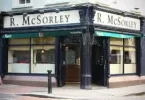ECJ advised decoder cards not illegal
Advocate General Juliane Kokott, has given this advice to European Court of Justice judges who’re expected to adjudicate later this year on the landmark case of UK pub landlady Karen Murphy of the Red White and Blue pub.
The Portsmouth-based publican made use of a Greek satellite broadcaster, Nova, rather than pay the much pricier BSkyB a monthly subscription for this service.
It was claimed that this put her in breach of copyright legislation for using a broadcaster unauthorised in the UK, so she appealed the judgement to the ECJ who must adjudicate on whether sports distribution rights can be sold on this basis or must be limited to each country’s boundaries only.
The Court will also adjudicate on the use of decoder cards from non-UK broadcasters for showing Premier League games in pubs.
The advice has the potential to revolutionise the way televised sporting rights are sold across Europe as the FA Premier League sells TV rights on an exclusive basis to European broadcasters and is presently trying to prevent pubs buying in live coverage from foreign broadcasters using decoder cards.
In the opinion of Juliane Kokott, the "economic exploitation of the [TV] rights is not undermined by the use of foreign decoder cards as the corresponding charges have been paid for those cards.
"Whilst those charges are not as high as the charges imposed in the UK there is … no specific right to charge different prices for a work in each member state."
And while not binding, the ECJ tends to follow the advice of Advocate Generals in the majority of cases, with serious implications for both Premier League and BSkyB.
The Premier League’s claim that it held exclusive rights was dismissed.
"There are no comprehensive rights which protect the communication of a broadcast to the public where no entrance fee is charged," she said.
The Advocate General’s opinion would "damage the interests of broadcasters and viewers of Premier League football across the EU", claimed Premier League which added that it did not appear to be compatible with the “existing body of EU case law”.
At stake is the Premier League’s current deal with BSkyB which will net it more than £1.6 billion over three years in the UK and another £1 billion is likely to come in from TV deals beyond the UK for the 2010 to 2013 period.
Industry sources reckon that BSkyB nets around £200 million a year from subscriptions to pubs and other commercial premises in the UK.
The ECJ’s judgement, when made, will have to be sent to the High Court in London for final processing.
A Premier League statement read, “If the European Commission wants to create a pan-European licensing model for sports, film and music then it must go through the proper consultative and legislative processes to change the law rather than attempting to force through legislative changes via the courts.
“The ECJ is there to enforce the law, not change it,” concluded the Premier League.








